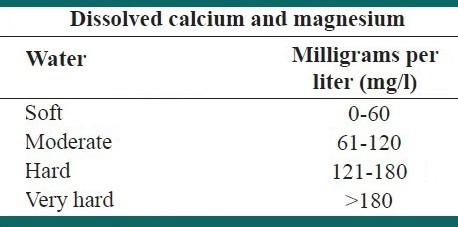Water Softener Vs. Water Purifier – What’s The Difference

Confusions are bound to occur regarding anything new you may come across in your life. It is entirely normal not to know the differences or similarities between certain things.
This is why we have written this post, to do away with all your doubts regarding water softeners and water purifiers. Each subheading eases you into the actual matter while also giving additional information about the basics of the differences between a water softener and a water purifier.
What is Hard Water?
There are usually two types of water supplies to each house in India. One is the more common municipal water supply and the less common borewell water. The former is usually the main source of water in cities and urban areas, whereas the latter is generally more common in rural areas and unauthorized colonies.
If we say that the municipal water supply is soft water and borewell water is hard water, you will ask how I know the difference. Let us explain.
The municipal water supply is primarily processed for drinking. So, it undergoes various processes to make it fit for drinking, meaning any particulate matter and minerals are completely removed.
In the borewell water supply, a groundwater pump gives us water directly from the groundwater table without processing. So, the water consists of many particles and minerals such as calcium and magnesium in considerable amounts.

Depending on the area you live in, the groundwater quality can be very good or very bad. Irrespective of the level of contamination, groundwater generally contains a high level of dissolved solids and minerals.
The presence or absence of these minerals and dissolved solids is what makes your water hard or soft.
Hard water is not considered fit for both drinking and daily chores like washing and bathing. How damaging can hard water be, depends on the level of hardness.
When coming in contact with soap or detergent for bathing or washing clothes/floors, respectively, the calcium and magnesium ions react with soap and detergent, forming calcium and magnesium residues. You will notice these residues as white faded patches, which is not very appealing and does not fulfill the purpose of cleaning.
How Does Water Softening Work?
This is relatively easy to understand now that you have understood the difference between hard and soft water.
There are several ways of converting hard water to soft water but the most popular and most effective is ion exchange.

An Ion-exchange hard water softener passes the hard water through resin beads (generally common salt that you use in your home). The negatively charged sodium ions in the ‘resin beads’ attract the positively charged mineral ions in the hard water and bind the ions to themselves, leaving the water mineral-free.
Water Softening thus works on the above principle in converting hard water to soft water.
How Does Water Purification Work?
Unlike a water softener, a water purifier, depending on purification stages, filters out not only minerals but other impurities such as dirt, dust, sand, bacteria, viruses, chlorine, pesticides, heavy metals, and other contaminants. A water purifier is slightly more complex in its working than a water softener because it is not a single-step process but involves several layers/stages of filtration.
In simple terms, water purification is a two-step process, of which the primary is physical filtration and the secondary is chemical filtration. Physical filtration involves removing physical contaminants like dirt, dust, sand, etc., while chemical filtration involves removing impurities, invisible to the naked eye, like bacteria, viruses, chemical impurities like chlorine, pesticides, heavy metals, and other dissolved solids.
Does a Water Softener Purify Water?
No. A water softener does not purify water. This is a common misconception, but there is an evident difference between the functioning of both.
As explained above, the two water-related machines perform different functions in treating water. A water softener only reduces the hardness of water but cannot filter out visible and invisible impurities like a water purifier.
Hence, a hard water softener cannot purify water.
Click to read: Why Water Softeners Do Not Reduce TDS?
When Do You Need a Water Softener?
The science behind a water softener turns hard water into soft water by removing minerals: calcium and magnesium from it. You should use a water softener for home if –
- you want to make the water fit for daily chores like bathing, cleaning, washing clothes and utensils.
- you want to avoid damage to your bath fittings and home appliances like washing machines, water heaters, dishwashers, etc.
In short, you need a water softener to make water fit for all daily uses except drinking.
When Do You Need a Water Purifier?
If the water supplied to your area is contaminated and unfit for drinking, you need a water purifier.
With several stages of purification and different types of filters and membranes, a water purifier filters out all visible and invisible impurities and presents you with freshly cleaned and safe drinking water.
Can I Use Both Interchangeably?
No. A water softener does the conversion of hard to soft water. On the other hand, a water purifier treats physical and chemical pollutants/adulterants.
One cannot replace the other as their functioning principles are different. Therefore, you cannot use both interchangeably.
Conclusion
We are sure by now you have understood the difference between a water softener and a water purifier. The detailed descriptions and FAQs would have cleared any doubts or misunderstandings you had about either or both of them.
So now, with this clarity, you can buy the one that best suits your requirements.
All the best! Thank you for reading!



